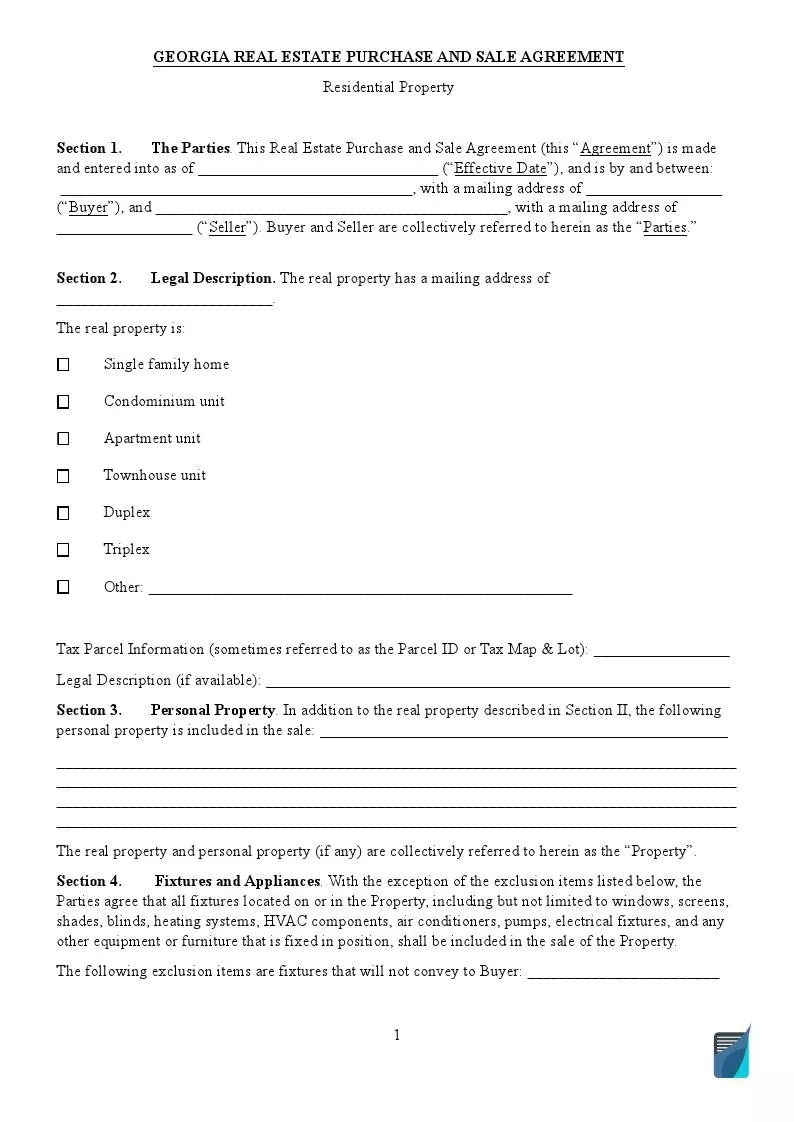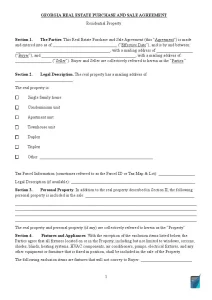Georgia Real Estate Purchase Contract
A real property purchase agreement is a legally binding form reporting selling or buying residential or commercial real estate and other transaction-specific data. In the state of Georgia, such a purchase agreement enters into force once both parties get acquainted with all the stated terms and requisites, accept them, and finally countersign the agreement. Though the prerequisites and contents of this document are negotiable and may vary, its fundamental aspects are specified by both parties. They should indicate the following core points of the deal:
- Crucial personal information related to both parties, including names, mailing addresses, and other essential personal data about the tenant and the buyer
- Property conditions and its location
- Earnest money deposit and closing costs
- Other essential purchase details and financial peculiarities

Build Your Document
Answer a few simple questions to make your document in minutes
Save and Print
Save progress and finish on any device, download and print anytime
Sign and Use
Your valid, lawyer-approved document is ready
Georgia Residential Purchase and Sale Agreement
When it comes to selling or buying a certain type of property, Georgia residents are expected to compose and negotiate a purchase agreement detailing the residential real estate ownership transfer. The fillable real estate sales contract bestows both parties certain rights and certain liabilities, as well. According to Georgia statutes, landowners/sellers should inform purchasers about the known damages and potential hazards surrounding them.
A basic residential purchase and sale contract in the state of Georgia should cover the following features:
- Both parties: names, mailing addresses, etc.
- The real estate’s legal description, physical address, and other details
- Personal items and belonging that are part of the transaction process
- Earnest money deposit
- Purchase costs and financing prerequisites
- Closing costs and terms
- Title transaction terms
- Description of the property’s condition
- Jurisdiction
- Required disclosures
- If applicable, other extra terms or disputes regulations
- The signatures of both parties
Georgia Commercial Purchase and Sale Agreement
Commercial Purchase and Sale Agreement is the legally binding form that activates the deal between a landlord and a future purchaser regarding commercial real estate and sets forth other transaction-related regulations. The buyer is expected to elaborate on such an agreement and proceed to negotiate its conditions with the proprietor. Both sides define the termination conditions of the commercial purchase and sale agreement.
The core points to include in the Commercial Purchase and Sale Agreement are:
- Personal information regarding the seller and purchaser
- Type of the property on sale
- Bank and seller financing options
- Inspection period
- Required disclosure statements
- Defaults and penalties
- Closing dates
- Potential disputes, regulations, and so on.
Once the buyer has formulated the contract’s draft, finally, it’s the seller’s decision and signature that brings the agreement into force. Thus, the property owner has the right to re-define and negotiate specific points in the agreement, reject the offer, or sign the deal.
Required Seller Disclosures in Georgia
Whether it is a Residential or Commercial Purchase and Sale Agreement, a seller must inform the buyer about any clear deficiencies in the premises. The so-called “known defects” can influence the buyer’s ultimate decision to purchase the particular property and should be indicated in the Property Disclosure Statement.
This may contain information on the terms of the latest remodeling, plumbing, electrical, heating, conditioning, roofs, gutter, or structural issues, damages to systems and components, data about any harmful substances in the stated location, and so on. Though this document is not entitled by law in the State of Georgia, it remains an essential requirement for landowners to unveil any material defects to a future purchaser, including issues that otherwise would not be apparent to the buyer.
Lead-Based Paint Disclosure
Based on the U.S. Code, specific documentation regarding the potential hazards, including those related to lead paints applied in the house, must be provided by the seller to the purchaser.
Keep in mind that federal law has particular disclosure requirements concerning lead paints. For instance, according to 42 U.S. Code, Sections 4851 through 56, if you are a landowner and your house was built before 1978, any known lead-based paint hazards in your home must be uncovered and specified to the customer in the disclosure statement before entering the property into a purchase. Under these regulations, the seller is obliged by law to:
- Give the customer a copy of any inspection report confirming or denying lead-based paint hazards in the stated premise.
- Provide the customer with an EPA-approved informational brochure.
- If applicable, give the customer an option to carry a lead-based paint inspection or assessment.
- Clearly indicate in the sales contract the warnings concerning the hazards associated with lead paint.
If the landlord did not disclose the above-mentioned conditions in the agreement, they could be held responsible for reimbursing the costs of the premise to the customer and taking additional expenses.
Seller’s Property Disclosure Statement
It is not strictly stipulated that the seller of a home or apartment must provide the purchaser with a disclosure form enumerating material facts related to the premises. However, it is still highly advisable that this statement be completed and delivered to the purchaser to prevent any potential disputes in the future.
This comprehensive form includes the complete history of the real property, data on certain past repairs, the specificities of its conditions, and related items and facilities within it, which will make your offer much more trustworthy and beneficial.
